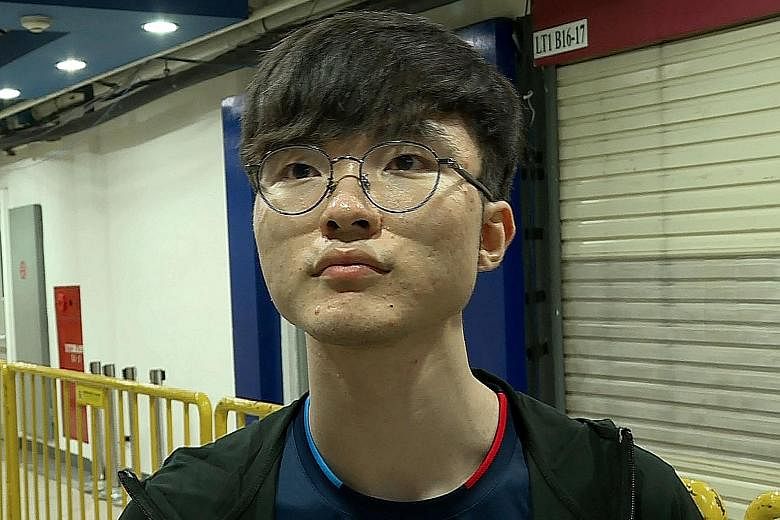JAKARTA • The undisputed superstar in the growing world of e-sports believes gaming deserves an Olympic place despite a mixed reception at the Asian Games, where it is making its debut.
Lee Sang-hyeok, better known by the moniker Faker, has gone from high school dropout to fame and fortune through e-sports, which is now knocking loudly on the door of the mainstream.
The South Korean added that e-sports' popularity among youth made it a must-have for both the Games, where it featured as a demonstration sport in Jakarta earlier this week, and the Olympics.
"E-sports has great potential to become an official sport in the Asian Games, as well as the Olympics," said the bespectacled League Of Legends player.
"It is immensely popular among the youth and has far bigger growth potential than any other sport."
The 22-year-old millionaire is among the biggest and best-paid competitors - with a contract rumoured to be worth US$2.5 million (S$3.42 million) annually from SK Telecom T1, not including prize money - despite the presence of compatriot and Premier League footballer Son Heung-min, and three-time Olympic swimming champion Sun Yang of China at the multi-sport Games in Indonesia.
Faker, dubbed the "Michael Jordan of e-sports", enjoys fame and fortune similar to professional basketball or baseball players in gaming-obsessed South Korea.
There, multiple TV channels are dedicated to broadcasting competitions, which are held at football stadiums to accommodate tens of thousands of fans.
With 25 million players, or half of South Korea's population, this makes professional gaming "just like any other sport", he said.
But e-sports does not enjoy the same level of global acceptance and attempts to win an Olympic spot have so far been rebuffed.
"When will (e-sports) be included in the Olympics? The simple answer is, 'I don't know'," said Kenneth Fok, the head of the Asian Electronic Sports Federation.
Even e-sports' long-trailed inclusion as a medal sport at the next Asiad in Hangzhou, China, has not been confirmed, after the Olympic Council of Asia said it could not give the go-ahead without an international federation for the sport - which does not yet exist.
Much of the resistance to e-sports comes from its non-athletic nature and a reluctance to encourage children to spend too much time in the virtual world, with China the first to brand online addiction a disorder.
And, unlike China's other events at the Games, state broadcaster CCTV did not screen e-sports, continuing a long tradition of keeping gaming off the airwaves.
AGENCE FRANCE-PRESSE

